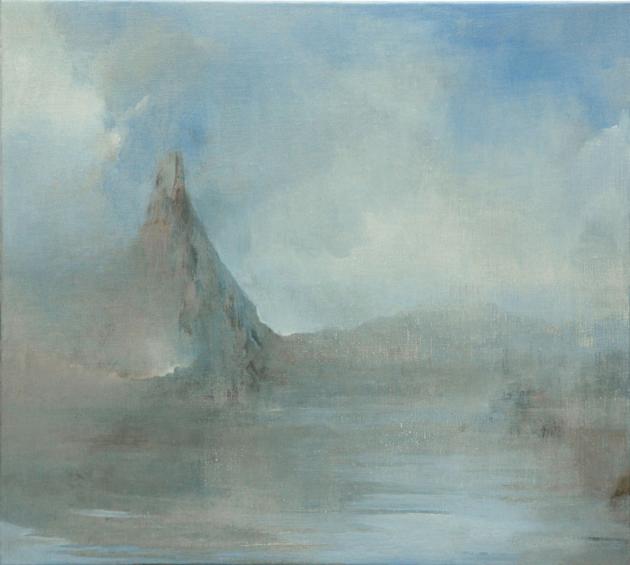PayneShurvell presents the exhibition ‘Louise Cattrell: Another Place’ in a new gallery space in Blandford Street with the artist’s sweeping landscapes. The works are concerned with the idea of ‘Landscape’ as an ideal. Since completing her artistic studies in London and Dundee, Cattrell has travelled widely, taking up residencies which have fed into her work.
The artist’s travels inform her paintings. But not in quite the way the viewer might expect. Cattrell visits various landscapes both in Scotland and abroad, experiencing vistas, but without working directly at the scene, there is no photography, or sketching as one might expect from a preparatory point of view. Instead the artist memorises the location, only later creating her work directly from memory.
The resulting landscapes ‘echo the spirit of Romanticism’ but perhaps more so through the nature of an ambiguity resulting from memory. The works incorporate both the language of abstraction, and that of landscape painting to form a relationship between the two; the paintings possess the quality of both forms. The images ‘vibrate’, occupying these two positions simultaneously.
Cattrell’s practice of working entirely from memory adds a temporal aspect to the work. The passing of time is an agent as purposed as the artist’s brush; increasing Cattrell’s subjective visualisation of the landscape. In fact the artist sometimes returns to a canvas many years later to add detail. This action encourages a journey away from the language of landscape and toward the language of abstraction. After all, these works are not paintings of landscapes, but are in fact paintings of memories of landscapes, allowing the artist to change the works as the memory of the location changes its own form in the mind of the artist.
The works are a little reminiscent of Turner’s later paintings, where the artist’s study of light drew his work ever-closer to an early form of abstraction. But here we have the addition of time in the form of art history; unlike Turner, these works are ‘post-abstraction’ and can therefore implicitly reference it as an officially recognised language, unlike Turner who pre-empted it.
The works possess an obscure narrative, the viewer may at once project themselves into the landscape, or find themselves unable to pierce the swathes of abstraction before their eyes. The paintings titles also serve to maintain this particular balance between two languages. The works remain intangible, simultaneously open and closed in terms of reading. Cattrell’s practice revolves around subjective memory to create a primary image as opposed to traditional landscape painting’s secondary image.
The artist employs a duality of language to flip between perspectives when reading her work. The viewer may find themselves watching rolling mists in a Scottish landscape, or instead read the patina of a contemporary abstract. Cattrell’s work proves an assured understanding of the history of language in painting.
Louise Cattrell: ‘Another Place’ – PayneShurvell at 71 Blandford Street, London W1 – until 16 May 2015
Words: Paul Black. Photo: courtesy of PayneShurvell © Artlyst 2015 all rights reserved

